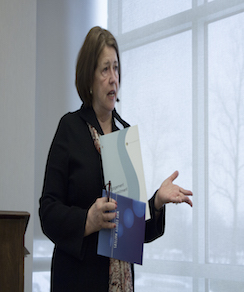On Thursday, April 11, Nick Melrose and I conducted a webinar on Review and Reflection, which can be accessed on the Pathways to Results website. Review and Reflection1 comprises the final group of activities that PTR teams go through in a PTR cycle. Review and Reflection affords PTR teams the dedicated time and outlines specific processes to help them document what they have learned throughout the PTR process. Taking time to pause and think about individual and organizational learning is a relatively unique opportunity for many practitioners. I’d like to share a bit more information about the four concepts that provide the foundation of activities conducted during Review and Reflection. The first is storytelling. We include storytelling in PTR for several reasons: to share information informally but in a structured meeting among PTR team members, to create new knowledge and raise awareness among the group about others’ perspectives, and to expand our own thought processes by hearing others’ views. In telling stories, PTR teams help create a culture and collective identity of people who are dedicated to program improvement, to using data to make decisions, and to focus on more equitable outcomes for all students. Through storytelling, PTR teams achieve a deeper understanding of the PTR process and the outcomes it achieved.
Review and Reflection is, at its essence, a form of reflective practice. Of the many models of reflective practice, OCCRL adopted Chris Argyris and Donald Schön’s work and the concept of double-loop learning. Argyris and Schön tell us that human behavior is never accidental but rather, based on our belief systems – both known and unknown. As a result, we inadvertently have created some of the problems we try to solve. However, by constantly examining and questioning the thinking behind our actions and the processes we create, we can improve our processes and thus, the outcomes that are the result of them. The activities undertaken during Review and Reflections ask PTR participants to think about what they believe, how they feel, what they learned so that when faced with similar situations in the future, their actions and the processes they develop will reflect what they have learned works better. In other words, as our learning improves through reflective practice, so will the organizational practices we create.
There is a lot of talk about sustainability in education these days. We know that some things are sustained in every organization. Some work and some don’t; what’s a mystery is that even those practices and policies that don’t work are sometimes sustained! With PTR, our goal is to sustain the improvements that we have data to support, as measured by the outcomes and evaluation measures we create in PTR that help determine their value. PTR is based on using data, and we use that data to make decisions on what to sustain. So, an important part of Review and Reflection is to have conversations about sustainability, which is built into the process from the beginning when the PTR partnership is formed.
Finally, the solution arrived at via the PTR process is meant to be scaled up or spread to other programs of study, to other departments, to any part of the career pathway system that recognizes the value it adds to program planning and improvement. It’s important to recognize that the nuances and details of a very good, improved process will likely have to be changed to some degree in order to adapt to a new application. That is normal and should be expected. What does not change when scaling up PTR improved processes are the values and core beliefs PTR is based on: a commitment to equity – to learning – to improving processes so more students achieve better outcomes, and to using data to make those decisions. I encourage you to go to the OCCRL website and watch a short video by Jeanne Century of the University of Chicago who talks about sustaining and scaling educational innovations.
Cathy Kirby is a Research Information Specialist at the Office of Community College Research and Leadership. She has provided coaching and professional development to PTR teams and others since its inception.
1. Bennett, S., Bragg, D., & Kirby, C. (2012). Review and Reflection.(Rev. ed.). Champaign, IL: Office of Community College Research and Leadership, University of Illinois at Urbana-Champaign.